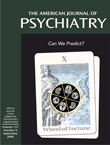Premorbid Functioning in a National Population of Male Twins Discordant for Psychoses
Abstract
OBJECTIVE: The goal of the current study was to compare premorbid behavioral and cognitive functioning between co-twins discordant for psychotic disorder and between these pairs of twins and pairs of twins with no psychotic disorders. METHOD: The authors linked data from the Israeli Draft Board Registry, which contains cognitive and behavioral assessments of all 16–17-year-old male Israeli twins, with data from the National Psychiatric Hospitalization Case Registry. Pairs of male twins who were healthy at the time of testing but discordant for psychoses later on were compared with one another and with pairs of healthy male twins. RESULTS: The affected twins performed significantly worse than healthy twins on measures of individual autonomy, social functioning, and physical activity and nonsignificantly worse on measures of abstract reasoning. There were no significant differences in cognitive or behavioral scores between the co-twins who did or did not develop psychotic disorders. CONCLUSIONS: The authors conclude that these findings underscore the familial nature of behavioral and cognitive deficits antecedent to psychoses.



